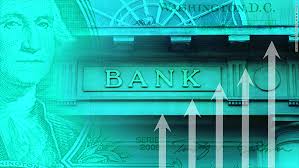American banks had their most profitable quarter ever

American banks are hauling in record-setting profits just as Congress prepares to cut regulations.
Bank profits soared by 28% during the first three months of 2018 to $ 56 billion, according to statistics published by the FDIC on Tuesday.
The blockbuster earnings report, boosted by President Donald Trump’s tax cuts and the healthy economy, easily tops the prior record set just three quarters earlier.
The stellar results were released hours before the House of Representatives is expected to pass legislation that would roll back some rules on community banks and regional lenders designed to prevent another financial crisis.
Although bankers have complained of excess regulation, the FDIC report shows that the industry is hardly drowning in regulation. The Dodd-Frank reform law was signed into law in July 2010 by former President Obama. Since then, bank profits have increased by 135% as the American economy climbed out of the Great Recession.
At the urging of regulators, American banks have also built up quite the rainy day fund. The industry is sitting on nearly $ 2 trillion of capital that can help weather the next storm. Wall Street is betting that deregulation will let banks return some of that cash back to shareholders.
The FDIC said that 70% of the nation’s 5,606 banks grew their bottom line during the last quarter. The percentage of money-losing banks dropped to just 3.9%. The FDIC’s list of problem banks fell to just 92, the lowest level since the first quarter of 2008. Problem banks are at risk of failure.
Related: Big banks are minting money right now
The financial industry owes a chunk of the mega earnings to Trump’s corporate tax cut. The FDIC said the tax law boosted bank profits by about $ 6.7 billion.
However, banks would have still made a record $ 49.4 billion without the tax cuts.
“Tax reform has allowed an already strong banking industry to grow even stronger,” James Chessen, the chief economist of the American Bankers Association, said in a statement.
Not surprisingly, the vast majority of the industry’s earnings come from the mega players on Wall Street, which are not directly helped by the deregulation legislation. Big banks reported gigantic profits during the first quarter, thanks largely to the tax cuts.
Both Morgan Stanley (MS)and Bank of America (BAC) logged record quarterly earnings, while a critical measure of profitability at Goldman Sachs (GS) hit a five-year high.
More impressive, JPMorgan Chase (JPM), the largest American bank, made $ 8.7 billion last quarter. That was the largest quarterly profit by any US bank ever.
Lending has been a sore spot for larger banks, despite the strength of the US economy and healthy bank balance sheets. The FDIC said that commercial and industrial loans increased by 1.9% last quarter, while nonfarm nonresidential loans ticked up by 0.8%. Mortgage lending inched just 0.4% higher.
“Loan growth has remained anemic,” said Brian Gardner, Washington policy analyst at investment bank KBW. He cited a combination of “weak” demand for loans and regulatory pressure.
“Regulators have been looking over bankers’ shoulders with increased vigilance since the crisis,” said Gardner.
Related: House clears path to roll back post-crisis banking rules
Community banks, which many say were unfairly snagged by Dodd-Frank, look healthy as well. The FDIC said that the nation’s 5,168 community banks grew their bottom lines by 18% during the first quarter to $ 6.1 billion. The agency noted that community lenders grew loans faster than the overall industry.
Still, FDIC Chairman Martin Gruenberg warned banks not to get reckless just because the US economy is humming along right now.
“With the current expansion in its latter stage,” Gruenberg said, “the industry needs to be prepared to manage the inevitable downturn in order to avoid financial system disruption.”






